Грег Иган - Distress
Здесь есть возможность читать онлайн «Грег Иган - Distress» весь текст электронной книги совершенно бесплатно (целиком полную версию без сокращений). В некоторых случаях можно слушать аудио, скачать через торрент в формате fb2 и присутствует краткое содержание. Жанр: Фантастика и фэнтези, на английском языке. Описание произведения, (предисловие) а так же отзывы посетителей доступны на портале библиотеки ЛибКат.
- Название:Distress
- Автор:
- Жанр:
- Год:неизвестен
- ISBN:нет данных
- Рейтинг книги:3 / 5. Голосов: 1
-
Избранное:Добавить в избранное
- Отзывы:
-
Ваша оценка:
- 60
- 1
- 2
- 3
- 4
- 5
Distress: краткое содержание, описание и аннотация
Предлагаем к чтению аннотацию, описание, краткое содержание или предисловие (зависит от того, что написал сам автор книги «Distress»). Если вы не нашли необходимую информацию о книге — напишите в комментариях, мы постараемся отыскать её.
Distress — читать онлайн бесплатно полную книгу (весь текст) целиком
Ниже представлен текст книги, разбитый по страницам. Система сохранения места последней прочитанной страницы, позволяет с удобством читать онлайн бесплатно книгу «Distress», без необходимости каждый раз заново искать на чём Вы остановились. Поставьте закладку, и сможете в любой момент перейти на страницу, на которой закончили чтение.
Интервал:
Закладка:
I sat two (empty) seats to the left of Violet Mosala, but I hardly dared glance her way. When I did, she kept her eyes on Buzzo, but her expression became stony. I couldn’t imagine what means she suspected I’d employed to win the contract for the documentary. (Bribery? Extortion? Sex? If only SeeNet could have been so divertingly Byzantine.) It didn’t really matter how I’d done it, though; the injustice of the end result was self-evident, regardless.
"So this path integral," said Buzzo, "gives us an invariant!" His latest crisp diagram of knotted tubes suddenly blurred into an amorphous gray-green haze—symbolizing the shift from a particular space-time to its generalization in pre-space—but the three vectors he’d sent to circumnavigate the simulated universe remained fixed. "Invariants" in an All-Topologies Model were physical quantities which could be shown to be independent of such things as the curvature of space-time in the region of interest, and even how many dimensions it possessed; finding invariants was the only way to make any kind of coherent physics emerge from the daunting indeterminacy of pre-space. I fixed my gaze on Buzzo’s steady vectors; I wasn’t entirely lost yet, after all.
"But that’s obvious. Now comes the tricky part: imagine extending the same operator to spaces where the Ricci curvature is nowhere-defined —"
Now I was lost.
I gave serious thought to calling Sarah again, and asking if she’d be willing to take back Violet Mosala. I could have handed her the footage I’d shot so far, smoothed out the administrative glitches with Lydia, and then crawled away somewhere to recover—from Gina’s departure, from Junk DNA —without having to pretend that I was doing anything but convalescing. I’d told myself that I couldn’t afford to stop working, even for a month… but that was a question of what I was used to, not a question of starvation—and without someone to share the rent, I was going to have to move house anyway. Distress would have kept me in leafy, tranquil Eastwood for a year or more—but whatever I did now, I was headed back to the outer sprawl.
I don’t know what stopped me from walking out of that incomprehensible lecture and away from Mosala’s justified distaste. Pride? Stubbornness? Inertia? Maybe it came down to the presence of the cults. Walsh’s tactics could only become uglier—but that only made it seem more of a betrayal to abandon the project. I’d given in to SeeNet’s demands for frankenscience in Junk DNA ; this was a chance to atone, by showing the world someone who was standing up against the cults. And it wasn’t as if the rhetoric was about to give way to violence, Kuwale notwithstanding. This was arcane physics, not biotechnology, and even at the Zambian bioethics conference, where I’d last seen Walsh, it was God’s Image as usual—not Humble Science!—who’d pelted speakers with monkey embryos and doused unsympathetic journalists in human blood. No religious fundamentalists had bothered with the Einstein Centenary Conference; TOEs were either beyond their comprehension, or beneath their contempt.
Mosala said softly, "That’s nonsense."
I glanced at her warily. She was smiling. She turned to me, all hostilities momentarily forgotten, and whispered, "He’s wrong! He thinks he’s found a way to discard the isolated-point topologies; he’s cooked up an isomorphism which maps them all into a set of measure zero. But he’s using the wrong measure. In this context, he has to use Perrini’s, not Saupe’s! How could he have missed that?"
I had only the vaguest idea of what she was talking about. Isolated-point topologies were "spaces" where nothing actually touched anything else. A "measure" was a kind of generalization of length, like a higher-dimensional area or volume—only they included much wilder abstractions than that. When you summed something over all the topologies, you multiplied each contribution to the infinite sum by a "measure" of "how big" the topology was… a bit like weighting the worldwide average of some statistic according to the population of each country or according to its land area, or its Gross Domestic Product, or some other measure of its relative significance.
Buzzo believed he’d found a way of tackling the calculation of any real physical quantity which made the effective contribution of all the universes of isolated points equal to zero.
Mosala believed he was mistaken.
I said, "So, you’ll confront him when he’s finished?"
She turned back to the proceedings, smiling to herself. "Let’s wait and see. I don’t want to embarrass him. And someone else is sure to spot the error."
Question time arrived. I strained my limited grasp of the subject, trying to decide if any of the issues raised were Mosala’s in disguise—but I thought not. When the session ended and she still hadn’t spoken, I asked point blank: "Why didn’t you tell him?"
She became irritated. "I could be mistaken. I’ll have to give it more thought. It’s not a trivial question; he may have had a good reason for the choice he made."
I said, "This was a prelude to his paper on Sunday week, wasn’t it? Clearing the ground for his masterpiece?" Buzzo, Mosala and Yasuko Nishide were scheduled to present their rival TOEs—in strict alphabetical order—on the last day of the conference.
"That’s right."
"So… if he’s wrong about the choice of measure, he could end up falling flat on his face?"
Mosala gave me a long, hard look. I wondered if I’d finally managed to push the decision out of my hands: if she’d withdraw her cooperation entirely, leaving me with no subject to film, no reason to remain.
She said coldly, "I have enough trouble deciding when my own techniques are valid; I don’t have time to be an expert on everyone else’s work as well." She glanced at her notepad. "I believe that’s all the filming we agreed on for today. So if you’ll excuse me, I’m meeting someone for lunch."
I saw Mosala heading for one of the hotel restaurants, so I turned the other way and walked out of the building. The midday sky was dazzling; in the shadows of awnings the buildings retained their subtle hues, but in the glare of full sunlight they took on an appearance reminiscent of the oldest quarters of some North African cities, all white stone against blue sky. There was an ocean-scented breeze from the east, warm but not unpleasant.
I walked down side streets at random, until I came to an open square. In the middle there was a small circular park, some twenty meters wide, covered with luxuriant grass—wild and unmown—and dotted with small palms. It was the first vegetation I’d seen on Stateless, except for potted plants in the hotel. Soil was a luxury here; all the necessary minerals could be found in the ocean, in trace amounts, but trying to provide the island with enough topsoil for agriculture would have meant trawling several thousand times the area of water required for the algae-and-plankton-based food chain which met all the same needs.
I gazed at this modest patch of greenery, and the longer I stared, the more the sight of it unnerved me. It took me a while longer to understand why.
The whole island was an artifact, as much as any building of metal and glass. It was maintained by engineered lifeforms—but their wild ancestors were as remote to them as ancient buried ore bodies were to gleaming titanium alloy. This tiny park, which was really just an overgrown potted plant, should have driven that home mercilessly, puncturing the illusion that I was standing on anything but the deck of a vast machine.
It didn’t.
I’d seen Stateless from the air, spreading its tendrils out into the Pacific, as organically beautiful as any living creature on the planet. I knew that every brick and tile in this city had been grown from the sea, not fired in any kiln. The whole island appeared so "natural," on its own terms, that it was the grass and the trees which looked artificial. This patch of wild—"authentic"—nature seemed alien and contrived.
Читать дальшеИнтервал:
Закладка:
Похожие книги на «Distress»
Представляем Вашему вниманию похожие книги на «Distress» списком для выбора. Мы отобрали схожую по названию и смыслу литературу в надежде предоставить читателям больше вариантов отыскать новые, интересные, ещё непрочитанные произведения.
Обсуждение, отзывы о книге «Distress» и просто собственные мнения читателей. Оставьте ваши комментарии, напишите, что Вы думаете о произведении, его смысле или главных героях. Укажите что конкретно понравилось, а что нет, и почему Вы так считаете.
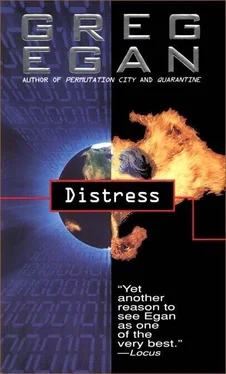

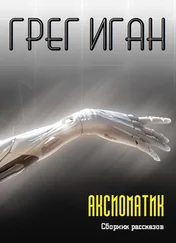
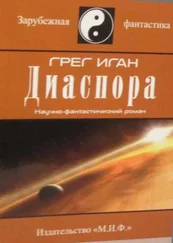
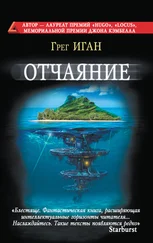
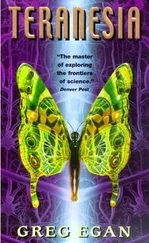
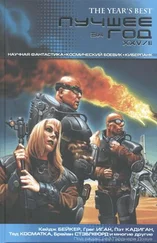

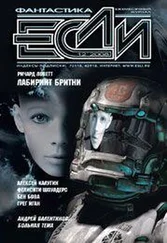
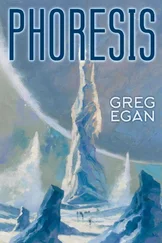
![Грег Иган - Рассказы [компиляция]](/books/419837/greg-igan-rasskazy-kompilyaciya-thumb.webp)
